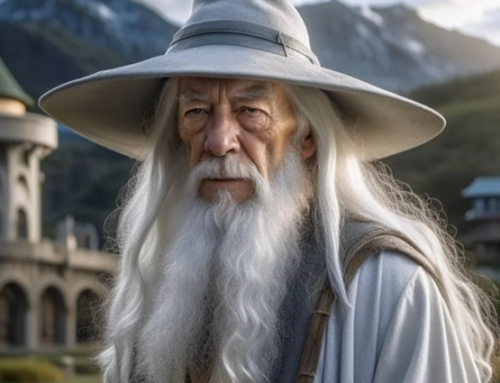Throughout the film “The Thin Red Line,” Private Witt seems to be in the midst of his own form of contemplative prayer in the environment of war. After all his compassionate searching, he, surrounded by the enemy, lays down his life for his friends and falls into a blissful gaze.
 I find Private Witt’s character in the film The Thin Red Line fascinating in many ways. But what sets him apart the most is the way he looks at people and nature with his mystical stare, as if what he were looking at contained within some fantastic mystery about to be unveiled.
I find Private Witt’s character in the film The Thin Red Line fascinating in many ways. But what sets him apart the most is the way he looks at people and nature with his mystical stare, as if what he were looking at contained within some fantastic mystery about to be unveiled.
In Terrence Malick’s 1998 film The Thin Red Line, Witt is played by Jim Caviezel. It becomes clear shortly into the film that he is at the center of this World War II epic, with the Battle of Guadalcanal as the backdrop, and that a kind of spiritual aura surrounds him which, in turn, affects others. I remember watching just bits and pieces shortly after it came out on video (remember that?), when I was maybe fourteen years old. And although I was far too young to understand and appreciate a film with such depth, I do remember sensing something mysteriously attractive about it. I didn’t see the film all the way through until I was twenty-seven, and to be honest, it left me feeling a bit depressed for some reason. But again, I sensed something begging to be discovered, or at least to be enjoyed on another level. I watched it again after some months had passed, and it became my favorite movie (and seven years later still is).
I love it for many reasons: the cinematography of that lush Pacific island; the director’s unique style which, rather than conventionally focusing on the narrative, instead focuses on nature, the characters, and philosophical questions put in poetic overtones; the beautifully composed score that is accompanied by a Melanesian choir native to the land; and especially the three or four scenes that put all of this together with the characters Pvt. Witt and Sgt. Welsh (Sean Penn) as they starkly contrast on the deeper questions of life and the world.
But since I’m not writing a review or praise of the whole movie, I’ll stick to the topic: What is Pvt. Witt searching for?
Truly I tell you, unless you change and become like little children, you will never enter the kingdom of heaven.
In the beginning of the film, Witt and a fellow soldier have deserted their platoon for a majestic island filled with natives. In his newfound utopia, he converses with the elders and plays with the children, seeming to have turned into a child himself. The place is his refuge away from the strict and constraining order of his platoon; and he goes back later in the film, hoping to escape the bitterness of battle. What is he searching for here? Perhaps Witt is a rebel at heart and feels the urge to wander. Or maybe he is battle-weary and needs respite from his unit. He seems to find it in the innocence and purity that the island and its meek inhabitants encompass.
You still believin’ in the beautiful light, are you?
Directly after the scene with the natives, which served as a sort of recess-time for Pvt. Witt, he is found by his unit and must go to the “principal’s office,” so to speak, to discuss his rebelliousness. This is the first of the aforementioned scenes with Witt and his superior, Sgt. Welsh. However, it is not just Witt doing the seeking; it’s also the worldly, cynical Sgt. Welsh, played to perfection by Penn. Sgt. Welsh tells Pvt. Witt that he is unfit to be in his unit (he may be right, at the time) and drills him for his insubordination. But Welsh sees something else in Witt beyond the surface, something foreign to himself that piques his interest. In this scene and the scenes that follow between the two, he tries provoking Witt with statements and questions in an attempt to dampen his spirit, but to no avail. Witt remains ideally meek, believing that even the hard-edged materialist Welsh still has “a spark” in him.
One such provocation sums up Welsh’s character and nihilistic philosophy: “What difference you think you can make… one single man in all this madness? If you die it’s gonna be for nothin’. There’s not some other world out there where everything’s gonna be okay. Just this one. Just this rock.”
There are other scenes where Witt is walking slowly among his men, trying to come to terms with the situation that they are all in. After one of the battles, while things have calmed and his fellow soldiers are resting at camp, he confronts the emotional pain he sees in each of them that the violence and death of war has left. The compassionate Witt seeks a deeper understanding and meaning of what has ensued; his way of seeking this is by his gentle empathy for his brothers and their pain in battle.
Greater love hath no man than this
Toward the end of the film, as Witt’s platoon is on patrol, moving down a shallow river, Japanese artillery fire falls nearby. Witt volunteers as one of three men to scout the enemy’s position. After advancing on their mission, the three are seen and shot at by the much larger Japanese force. Needing to warn the others, but also realizing the enemy’s overwhelming advance, Witt volunteers to stay behind and slow them down. It is here that he seeks the greatest love—to lay down his life for his friends.
I have read that in the deepest form of prayer, often referred to as contemplative prayer, one is to search for truth and meaning—usually in scripture or a spiritual reading—with quiet diligence and reflective thought. Then, without knowing it, one goes seamlessly from this deliberate search, to a kind of blissful gaze in which we gladly submit and lose control of our whole being. Throughout The Thin Red Line, Pvt. Witt seems to be in the midst of his own form of contemplative prayer. Instead of using scripture as his medium to meaning and truth, he uses the environment in which he initially loathes to be but to which he succumbs out of pure love for his fellow man. This environment is the chaos of war. And after all his compassionate searching, he too, being surrounded by the enemy, submits freely and falls into a blissful gaze.
What was Witt searching for? It is hard to say, exactly—probably many things. Maybe he didn’t know himself what he was after. But what he found, surely, was eternal peace.
The Imaginative Conservative applies the principle of appreciation to the discussion of culture and politics—we approach dialogue with magnanimity rather than with mere civility. Will you help us remain a refreshing oasis in the increasingly contentious arena of modern discourse? Please consider donating now.
The featured image is courtesy of IMDB.







The writer Barry Hannah, who was my professor at Ole Miss (may he rest in peace), loved this movie. He told me it was one of the few movies he ever bought the VHS for.
Thank you for this wonderful review and reminder of The Thin Red Line. It was the first of Malek’s movies that I saw and I’ve purchased a DVD copy. Every time I watch it I’m struck by the beauty of the cinematography and of the prayerful stance. The contrast of the underlying beauty and prayer in the midst of such horror and death is simply stunning. I especially remember the last scene when the soldiers are onboard their troop transport and leaving the island. The look of confusion, of bewilderment on their faces reminds me of the confusion that is so common in our lives as we find ourselves caught up in the midst of a great battle between Good and evil that is the context of our existence. Again, thank you so much.
Wonderful film.
As a sidelight, Barry Hannah, who taught at Clemson before moving to Ole Miss, has written a moving tribute to Bob Dylan’s Slow Training Coming album and its influence on Hannah’s own “re-conversion” to Christ and escape from alcoholism.